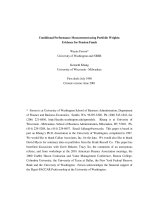Using if
Bạn đang xem bản rút gọn của tài liệu. Xem và tải ngay bản đầy đủ của tài liệu tại đây (10.97 KB, 1 trang )
Using if
If is a subordinating conjunction. It is mainly used to introduce a condition that must exist before something else
can happen.
If you don’t work hard, you will fail.
If she is late, we will have to go without her.
If she doesn’t pay the fee, she will not be allowed to take the test.
If clauses may also introduce a situation that may happen or may be real.
If you miss this opportunity, you will have to regret later.
If you want / like
This expression is used to suggest that somebody has the freedom to do what they want.
She can join us if she wants / likes.
If so
If so means ‘if this is true’.
Do you like our lessons? If so, would you mind sharing them on your favorite bookmarking sites?
If can be used to introduce a situation that always produces the same result.
If you heat ice, it melts.
I always get a headache if I don’t sleep well.
Indirect yes / no questions
If is used to introduce indirect yes / no questions. Whether is also possible in this case.
‘Are you ready?’ Rani asked me.
Rani asked me if I was ready.
‘Do you like classical music?’ she asked.
She asked me if I liked classical music.
I still haven’t decided if I am moving to another city.
Stay on top of your writing! Download our grammar guide from www.englishgrammar.org to stay up-to-date.
Powered by TCPDF (www.tcpdf.org)









